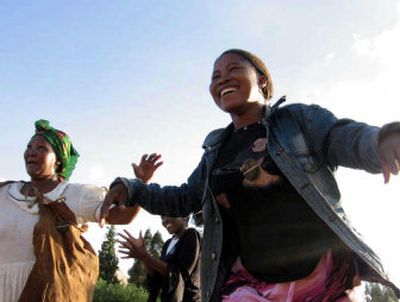African Bushmen win right to live in Kalahari

LOBATSE, Botswana – Botswana’s High Court ruled Wednesday that the country’s Bushmen are entitled to live and hunt on their ancestral lands in the Central Kalahari Game Reserve, a decision hailed as a victory for indigenous peoples.
The Basarwa tribesmen had accused the government of evicting them – in many cases at gunpoint – to exploit the diamond and mineral potential of a reserve the size of Switzerland.
The government claimed the tribe agreed to move as part of efforts to protect the reserve, that it had already owned the mineral rights, and that the tribe had been compensated for the land.
“I feel only happiness and confidence that I can go back,” said Junanda Gakelevone of the First People of the Kalahari, a group representing the Basarwa.
“I want to go back home now,” he said amid singing and dancing by some two dozen fellow tribesmen, many wearing traditional clothes and horns.
There was no comment from the government. The parties have six weeks to appeal.
For over 20,000 years, clans of hunter-gathers have survived in central Botswana’s stark, desert plains. They were the original inhabitants of a vast area stretching from the tip of South Africa to the Zambezi valley in Zambia and Zimbabwe.
Their rock paintings, knowledge of native wildlife and ability to survive in one of the harshest environments on Earth have fascinated scholars. They were the subject of a hit movie: “The Gods Must Be Crazy.”
The Basarwa, who are also known as Bushmen or San, were driven to near extinction by Bantu tribes who started pushing south from central Africa about 1,500 years ago and the Europeans who followed 350 years ago. The settlers took the most fertile land and the Bushmen retreated into the arid and semi-arid lands of the Kalahari desert. Only an estimated 100,000 are left today, most living in poverty on society’s fringes.
By a vote of 2-1, the judges found that the Bushmen were “forcibly and wrongly deprived of their possessions,” by the government. Gordon Bennett, a lawyer for tribesmen, said that referred to the land.
By a similar vote, the court ruled the refusal to allow the Bushmen into the game reserve without a permit was unconstitutional. It also said the state’s refusal to issue special game licenses to allow the tribesmen to hunt violated Botswana’s constitution.
The three-judge panel, in a unanimous decision, said the Basarwa were legally living on their land before 2002.
The court also ruled, however, that the government was not obliged to provide basic services like water to anyone returning to the reserve. And the court said the decision to cut off the services in the first place was neither “unlawful nor unconstitutional.”
Bennett said the Bushmen did not consider water and other basic services a big issue, and would now focus on negotiating with the government on an orderly return.
Some 2,000 of the Bushmen have moved to two new settlements, leaving a handful of holdouts. Government authorities say their living conditions have improved, with the provision of drinking water, schools and medical facilities.
But Bushmen representatives argue that they have suffered from the disruption to their traditional way of life and have fallen victim to alcoholism and AIDS.